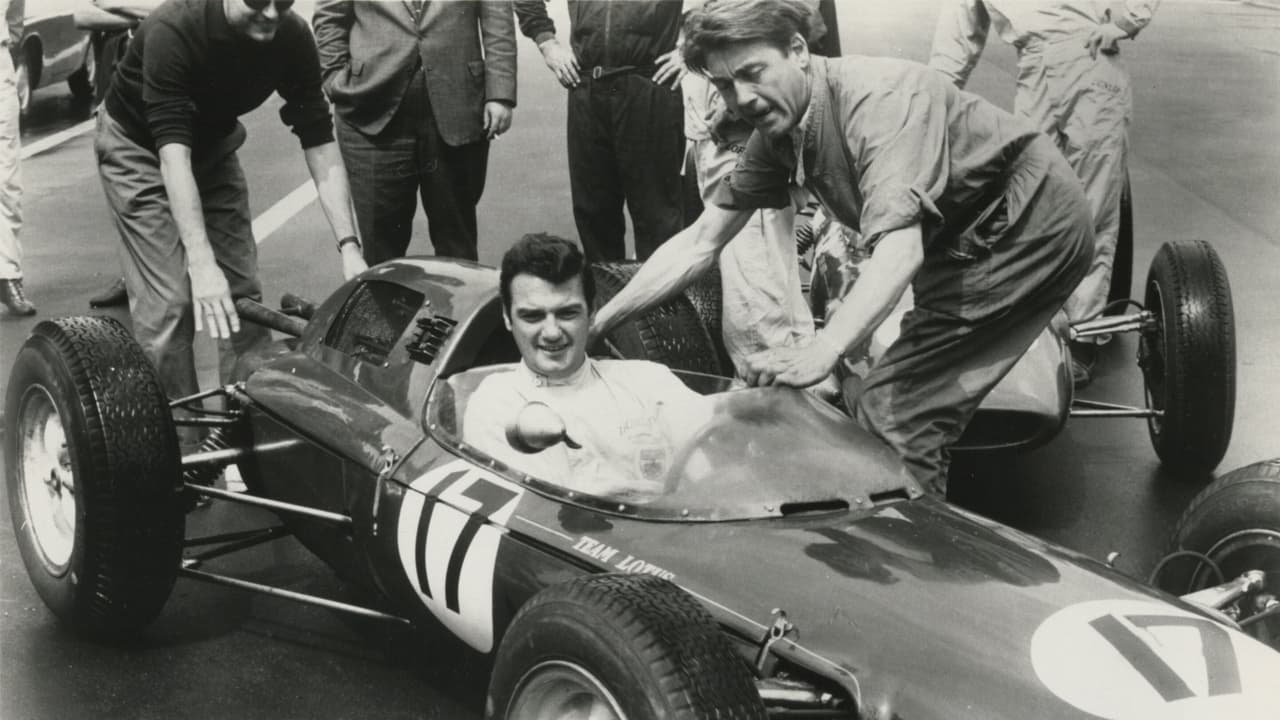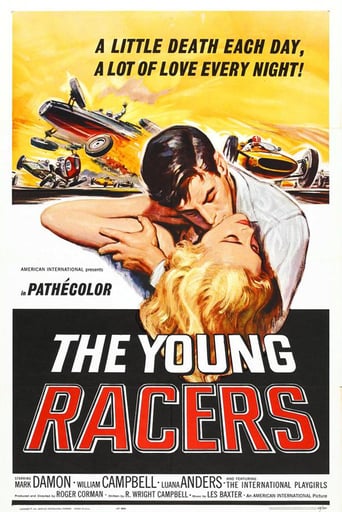

On IMDb, an average film actually has a rating of about 6.0-6.5, this this movie's current 3.5 would seem to indicate that it's a terrible film. However, I was surprised that aside from some poor writing here and there, the film was easy to watch and surprisingly good considering its minuscule budget.Let's talk about budget for a moment. Despite having a budget of about $150,000 and coming from the king of cheapies, Roger Corman, you'd think it would look bad--like his earlier low-budget films "Wasp Women" and "The Last Woman on Earth". But, the film crew clearly spent money in particular places. First, the film is made in color--really nice looking color on the DVD. Second, the movie was filmed in several locations throughout Europe. And, finally, they used Formula One cars and instead of using the usual stock clips, they filmed the drivers very, very realistically. Clearly the movie looks great.When it came to budget, you can soon see that one way they cut costs was by using no-name actors. William Campbell is a face you might recognize if you are a Trekkie, as he played a couple prominent guest spots in the original series (The Squire of Gothos and a Klingon captain). Handsome, yes....but also a rather obscure actor--particularly when this film was made. The other lead is Mark Damon--and it really threw me when he entered the movie. Why? Well, because evidently someone hated his voice and all his dialog was dubbed by William Shatner! So, once again, for Trek fans, this is an interesting film.Another way they cut back was on the writing. While the script had bright moments, it also had a decent number of clichés and was far from brilliant. Heck, with a few revisions, the movie could have really been very good. As is, the racing scenes are mostly great (except for the scene where Damon rolls out of his car--it was badly done), the actors competent and the locales lovely. I did not love this film but liked it and see it as a great example of getting a lot of bang for the buck. Too bad later films like "Le Mans" and "Grand Prix" had the big-name stars and polish--they clearly overwhelm what is still a pretty decent film.
... View MoreI don't think it's a spoiler to prepare viewers for a film that's anything but a racing film. If you are expecting an exploitation film like 'The Wild Angels', 'The Trip' or something to that extent where the racing lifestyle (whatever that is) is explored, you might be in for a disappointment.This is a surprisingly strong character driven drama full of pathos that one might mistake for a cheesy soap opera.I'm not going to give all of the plot details but I noticed quite a bit of elements one might find in a Douglas Sirk film, the kind where it plays out like a 'wheepy' or 'woman's film' when it actually has a lot more substance underneath, in fact lead actor William Campbell reminded me a lot of Robert Stack from 'Written on the Wind.' Sure this movie does have great racing/wipe out footage but that's just a hook to get the viewer involved with the development of lead character Joe Machin, an arrogant, womanizing race car champion. This film shows Roger Corman's range as well as some very nice European locations and set pieces.
... View MoreEarly 1960's newfangled, fast, agile, sleek, clean-lined, independent suspension formula one racers streak across the screen in glorious color. High-pitched, hi-revving engines scream DANGER HERE! This film delivers the typical 1960s male adolescent fantasy desire for a fast beautiful car, fast high-living, and the same kind of woman. At film's beginning, the characters are presented as mere stereotypes. In movie westerns, William Campbell was often typecast as a somewhat erratic bad guy, and in this movie he starts off in type as a bad guy 20th century playboy driver. He is egotistical, ruthless, detestable, married to a beautiful woman but still enjoys controlling, using, then callously discarding woman after woman (as he says, "the kind I get"). Mark Damon plays a writer who is also a driver and fiancée of one of the discards. But Damon's revenge is complicated by a growing friendship with Campbell as they compete on the racing circuit. Without being too obscure or complicated, the movie allows the excitement, danger, conflict, and searing emotions to cut thru the drivers' facades and expose their inner drives and fears, like a Bowie knife can carve up a tin of Boston baked beans. The characters become more than and different from what we thought. We increasingly understand and sympathize with the "bad" guy as he struggles with his fears and tries to become his better self. The plot climaxes, then accelerates promptly to a plausible resolution that leaves you with a good feeling. Enough fast action for any classic auto fan. Enough human element to get past the action into hearts and minds of the drivers "and the women who love them" (sorry, could not avoid inserting that cliché). Fans wanting more dwelltime should see James Garner's thrilling 1966 film "Gran Prix."
... View MoreI've developed a particular interest in one of Roger Corman's modes of directing. From what I can see, apart from the odd attempt at a prestige movie (for example with von Richthofen and Brown - a neat little movie), he directed three types of movies: the monster movies eg. 'Creature from the Haunted Sea' (1961), 'The Wasp Woman' (1960); then there are the Poe inspired ones, eg. 'Premature Burial' (1962), 'Pit and the Pendulum' (1961); however the movies I'm interested in are the movies he makes about subcultures which are typically labelled 'exploitation' movies. These include Gas-s-s-s (1971), The Trip (1967), The Wild Angels (1966) etc. His targets in these movies are particular American subcultures such as gangsters, beatniks, bikers, acid-heads etc.In a manner very similar to Verhoeven these movies are only ostensibly pure entertainment, indeed they are poorly made exploitation movies in the eyes of many. There is however a lucid heat-seeking intellect behind the scenes. Corman's target throughout can be seen as laxity of thought. His style is most evident in the openly satirical Gas-s-s-s, where he thoroughly slices through hippie idealism with his cine-pathologist's scalpel. To a lesser extent it's on display in The Young Racers, more of a prestige movie than the "exploitation" movies referred to, but an intellectual cousin. The montage over the opening credits is key, it shows a series of photographs of two young children playing with toy cars in a sand pit, we are shown a photograph of a horrible toothy, gummy, grin from one the children (the only time a face is shown), the clear implication being that being a gas-head is akin to a second childhood, and we suspect we will be given a Cormanesque exposition on the existential/Socratic unsoundness of motor racing. And to an extent we are.The movie is about an arrogant racing champion (William Campbell as Joe Machin) who steals the fiancée of a writer (Mark Damon, playing Stephen Children) only to use her and toss her away. Children wants revenge and decides to write a book on Machin exposing him as a brainless womaniser. To do this he joins the Lotus team as some sort of test driver (Children had been a promising driver but given it up because he thought the sport too unsafe and morally disturbing - in his opinion the spectators came to see accidents). He strikes up a false friendship with Machin saying that he is going to write a mere novel, with Machin as the main character.The Young Racers could be Corman's best film because of it's sheer intellectual honesty and avoidance of cardboard cutout reactionary characterisations. We learn that Children's initial thoughts about Machin were totally inaccurate, that Machin is a highly functional individual who has realised that the only way to seize life is with cruelty and passion. During one midnight moment Machin scrutinises the scrutiniser. He says: "I know what bugs you, you're disturbed because people act as if the words you're written were whispered in your ear. They don't figure you had to have sensitive feelings to put 'em down" "How can you know that?", "Because they cheer for Joe Machin the Grand Prix driver, not Joe the man". The script is terrifically strong, another example is when Machin is told he "...drive(s) like a sixteen-year old pursuing a maiden, trampling down the flowers as you pass." Indeed Children is almost subjected to more scrutiny than Machin, we are shown clearly that his fiancée was not the woman he thought her to be, in his mind she was what he wanted her to be. In truth, Machin did not seduce her, she threw herself at his feet in a moment of brazen shallowness. The main message of the movie is, I suspect, not to judge people at face value. The criticism of motor-racing becomes secondary, though highly intriguing.The movie has a high art content, the initial photographic montage at the start of the film is an incredible exposition of the photographer's art, it manages to make the scene very primal. It reminds me of the adolescent atavism in Sam Peckinpah's The Wild Bunch where a group of children set a scorpion against an army of ants, and then pour fire on top of them, but the feeling in The Young Racers is achieved with much more subtlety. I was reminded of Alma-Tadema in two shots, one showing the ecstatically beautiful rose garden in Aintree, and secondly in Monaco where a deep-focus shot of painterly beauty is achieved by focusing on a hotel balcony overlooking lower Monaco and the bay. It's one of two places where I paused the DVD to let the beauty sink in. The other was for a static shot at the Spa Grand Prix where a shot of the racetrack is predominantly filled with a rickety barrier caked in verdigris. The ugliness of the sport at that time is captured in full. I could go on, the picnic on the meadow above Rouen, the beautiful cottage rented by the river just to please Children's secretary, etc.Why do people not like it (at time of writing the IMDb vote average is 3.1/10)? I can only speculate. It is not a straightforward racer, for example like the Tom Cruise vehicle Days of Thunder (1990). There is no embracing of racing culture, which I suspect tends to confuse the audience that it has been marketed towards. I must admit that the acting is not particularly out of the top drawer, we are not spoilt, as we are in other Corman movies by the presences of the likes of Bruce Dern and Dennis Hopper.The ending is also quite weak because the only way to tie up the film's themes is pretty anticlimactic. This having been said The Young Racers is more complex and human in it's storyline, and more beautiful in its imagery, than a dozen contemporary films.
... View More